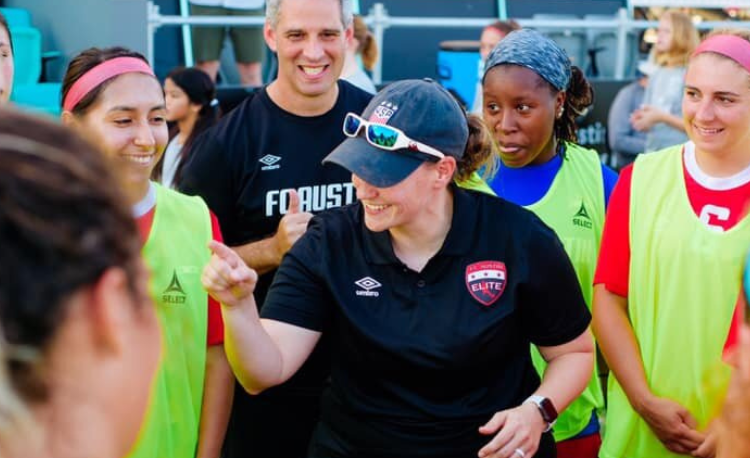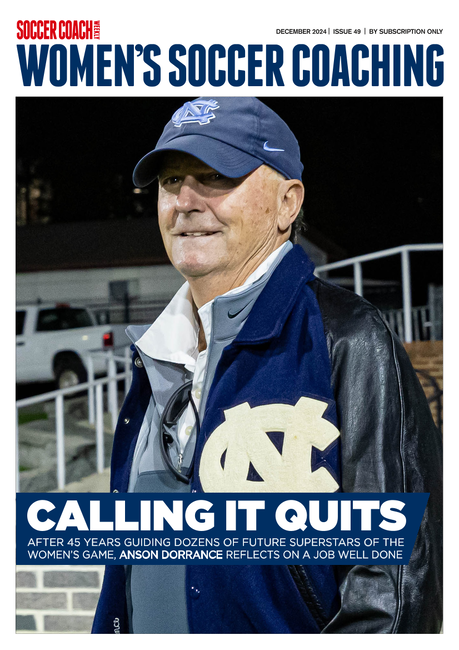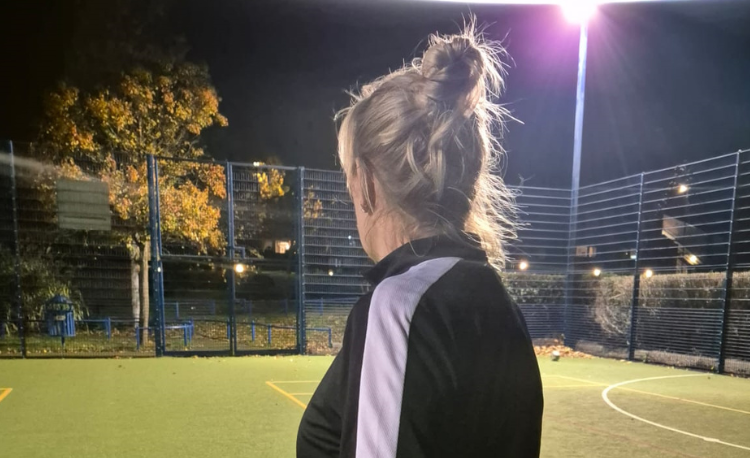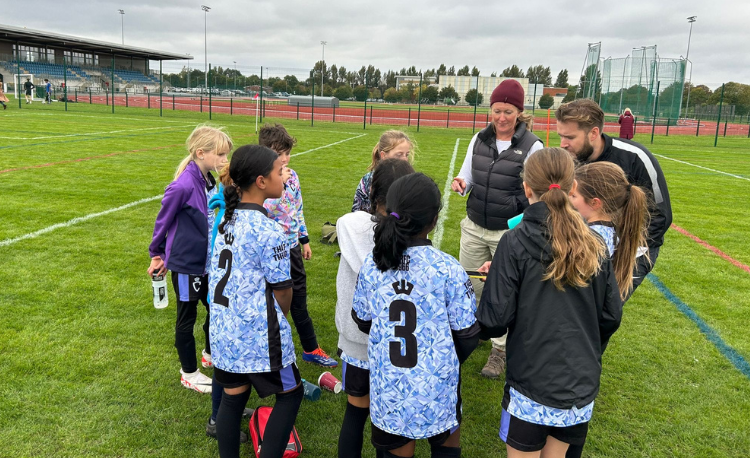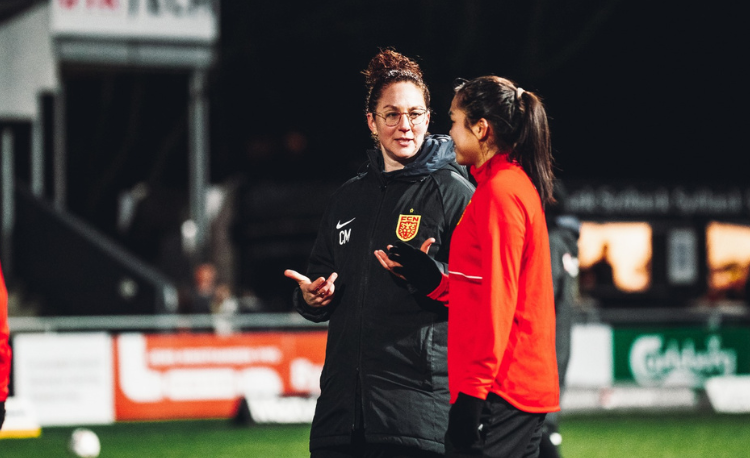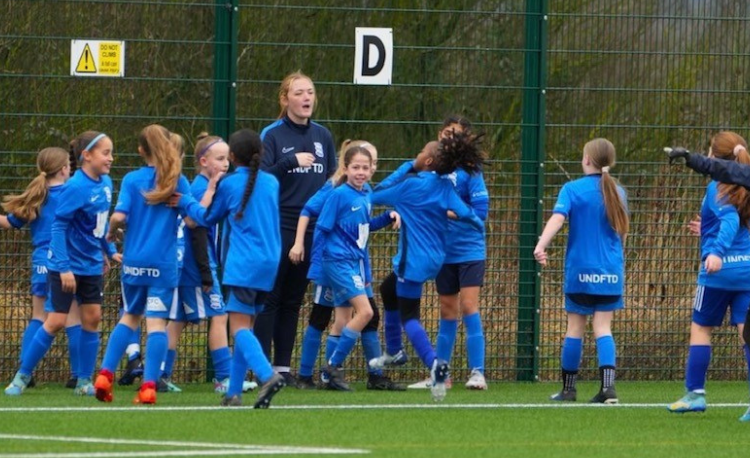You are viewing
1 of your 3 free articles
Jamie Meshew: Finding your coaching why
US Soccer coach educator Jamie Meshew tells Samantha Snow that there is always something to learn and improve upon – both in coaching and in life.
Jamie Meshew is a coach educator with the US Soccer Federation (USSF).
She has also been on the coaching staff of the St. Kitts and Nevis women’s national team and has coached numerous ages and levels of play over the course of her career.
Jamie holds the USSF A License, USSF National Goalkeeping License and the United Soccer Coaches Premier Diploma.
In this wide-ranging interview, Sam Snow caught up with her to discuss the importance of coach education, finding your coaching ‘why’ and supporting more women in coaching…
SS: When did you start coaching?
JM: I’ve been a coach for as long as there have been players younger than me around!
I started coaching local clinics and camps in my hometown when I was 14 and earned my first coaching license at 16.
As a former goalkeeper, I always saw myself as a bit of a coach on the field and the transition was an easy one when I was done playing. I continued to pursue coaching education to further develop myself and earned my A license before I turned 30.
I’ve coached youth, Olympic Development Progam, high school, college, semi-pro, and international teams.
SS: What was the first coaching course you attended? Do you remember much from that course?
JM: The first one was an old-school F license in my hometown when I was 16.
I don’t have a ton of memories of that course, but as I progressed through the pathway the things I remember most have been the connections with fellow student coaches and the opportunity to read and analyze the game differently.
Throughout my journey, I only ever had one female coach educator, and less than 10 fellow student-coaches were female in all the courses I have attended combined - hence why paying it forward for other women in coaching is so important to me.
SS: So how did you get into coaching education and teaching courses?
JM: I was thrown into coaching education years ago, almost by accident.
At the time, I was one of very few women in my area that held an A license and there was an old E license course being offered locally that had an educator drop out [at the] last minute. I agreed to help, and dove in headfirst without really understanding what was needed.
Over time, the process to become a coach educator has become more standardized and supported.
I have since had the opportunity to learn so much about andragogy [study of adult learning] and course facilitation, in addition to coaching-specific theory and methodology.
I love teaching all courses because I get to connect with coaches at all levels and help them along their pathway.
I am especially grateful for opportunities to mentor other women and be an example of women in coaching education.
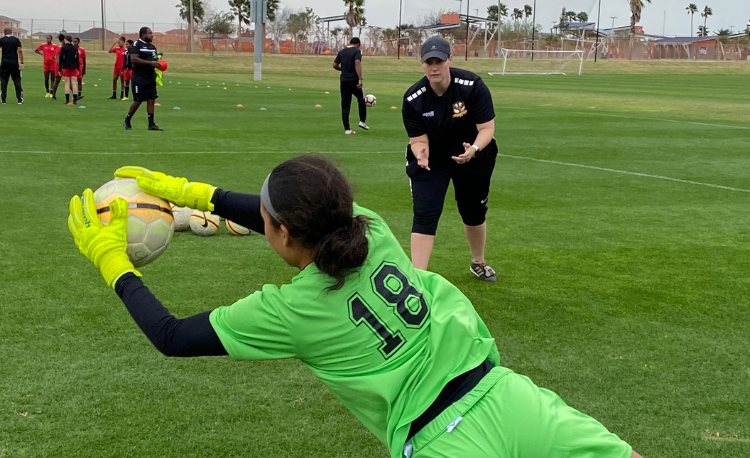
SS: Throughout all of your experiences as a coach and coach educator, what is the best piece of advice you would offer to a young or beginner coach? Would your advice perhaps be different for a more experienced coach?
JM: In my opinion, there will always be something we can learn and improve on – in coaching, and in life.
I just think about how much our game has changed and evolved over the course of our lives to date. I think back on some of the experiences I had as a player, and also as a coach just starting out, and marvel at how little I knew then.
Our primary responsibility as coaches is to create positive, welcoming environments for our players to be able to develop and improve in the game.
We can’t possibly expect to do that if we cannot grow as coaches along with them.
SS: How about advice specifically for women coaching?
JM: It is important to continue educating yourself so that you can continue to fight for a seat at the table.
More girls play the game of soccer [in the US] than boys, yet we have far fewer female coaches.
Role models can come in all shapes, sizes and gender identities, but it is critically important for both girls and boys to see, and learn from, women in these coaching positions.
We can’t get there if we don’t stay committed to our own growth.
SS: Why should coaches invest in coaching education? For anyone reluctant to pursue coaching education, what would you tell them?
JM: For those who are reluctant to invest the time and money into coaching education, I would challenge you to be thoughtful about what your real objection is.
In most cases, this hesitation comes from fear, uncertainty or doubt. If someone truly doesn’t believe that coaching education holds any value, then it will be hard to convince them otherwise.
But if that opinion comes from a lack of confidence that you will be able to pass the course; a misunderstanding of the purpose or structure of the course; or one past poor experience, I’d encourage you to look inward at your ’why?’ for coaching, and challenge yourself to be open-minded about what you could learn from adding additional experiences to your toolbelt.
SS: What would you say to a coach who wants to get more involved with coaching education and possibly become a coach educator themselves?
JM: I would first say: "Thank you!". We need to continue to be able to reach players at all levels and, in order to do so, we need coaches to not only educate themselves, but to help pass on that knowledge.
I recommend reaching out to your local member association to learn what opportunities might exist for coaching education development.
SS: There has been a lot of change in coaching education in the United States, recently. What have you noticed as the biggest shift?
JM: The change has been dramatic. There has been a purposeful mentality shift in coaching education, to not only standardize course offerings, but also to create environments that are much more student-coach centered.
The courses are an ongoing educational process, designed to meet student-coaches where they are and bring them along the pathway.
This really is an incredible shift away from all the previous approaches to coaching education.
There are more online-accessible courses, Spanish-language courses, women-only courses, as well as grassroots courses to help provide coaching education access to a broader range of coaches in various environments.
Related Files
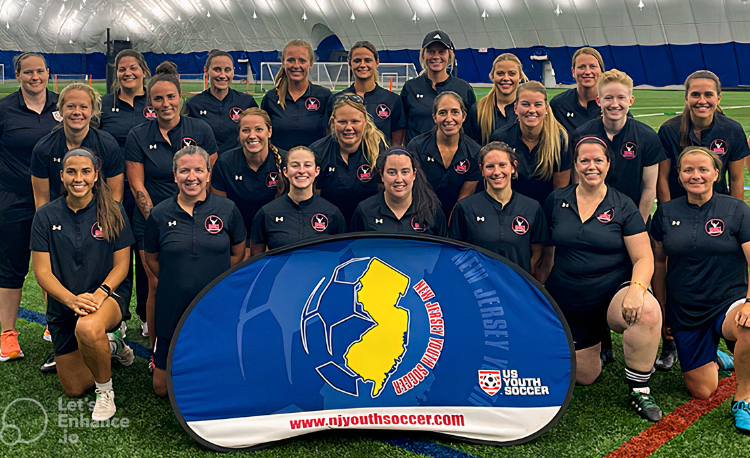
SS: With courses being more accessible and centered around the student-coach and their learning environment, have you noticed an increase in women participating in courses over the last five or 10 years?
JM: I don’t have the statistics on any of this. However, in my personal experience, I have had more student-coaches that identify as women in my courses, ranging from grassroots all the way to the C license.
That said, I have still had courses that were open to all that have had very few or no women in attendance.
This is a work-in-progress, and I believe it is important to identify and highlight opportunities to continue the growth in this area.
I have had the privilege of leading several all-women courses and those have been wonderful additions to the broader course offerings.
I feel strongly that these courses provide an opportunity for some who may not otherwise feel comfortable to attend a course.
Continuing to offer a broad range of programming will be a critical part of continuing to increase the number of women we have in coaching in the US.
SS: Can you share some of your experiences with the St. Kitts and Nevis team? Do you have a favorite memory?
JM: The opportunity to join the staff of the St. Kitts and Nevis women’s national team, as the goalkeeper coach for the Concacaf Olympic qualifiers, was an incredible experience. I learned so much about the international game at the senior level.
My favorite memory was simply getting to know the players and watching them grow in their confidence.
It takes a tremendous amount of bravery to suit up against some of the best teams in the world for the very first time, and they approached the challenge with energy and enthusiasm.
We didn’t win any games, but just having that experience in itself was life changing for me - and for them as well, I hope.
SS: Anything else you have learned along your journey as a coach and an educator?
JM: Ground yourself in your ’why?’. Really understand what your true motivation is for becoming a coach and check in with yourself regularly about what you are doing and if it’s in alignment with who you are at your core.
Coaching is a difficult, but extremely rewarding, profession. The influence we have on players of all ages is a tremendous responsibility on us, and it is crucially important to know who you are, and what you value, before you can begin to lead other people.
There are a number of things in coaching we will never be able to control, but we will always be able to control our own attitude and effort.
Bringing positivity and an open mind to our players, or the coaching education experiences we choose, and showing up with our best selves for them is how we will continue to grow the love of the game here in the US.
Coaching education is an excellent way to make sure you are setting an example for your players that there is value in growth and development – and you might learn something, too.
Newsletter Sign Up
Newsletter Sign Up
Discover the simple way to become a more effective, more successful soccer coach
In a recent survey 89% of subscribers said Women's Soccer Coaching makes them more confident, 91% said Women's Soccer Coaching makes them a more effective coach and 93% said Women's Soccer Coaching makes them more inspired.
*includes 3 coaching manuals
Get Inspired
All the latest techniques and approaches
Women's Soccer Coaching offers proven and easy to use soccer drills, coaching sessions, practice plans, small-sided games, warm-ups, training tips and advice.
We've been at the cutting edge of soccer coaching since we launched Soccer Coach Weekly in 2007, creating resources for the grassroots youth coach, following best practice from around the world and insights from the professional game.
